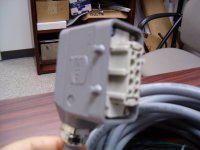Hi guys-
been a long time since i have posted but i believe someone out there can probably help.
I work in a meat plant that is HEAVILY washed for 4 hrs nightly. In the plant we have several machines that use pin and sleeve connectors to pass along I/O and estop circuits.
the problem that we are haveing is excessive downtime due to water inside the plugs as well as corrosion from the sanitation chemicals.
long story short, i am looking for a solution that would replace the plugs with something more water tight and thought one of you probably has run into this in your careers.
i will post a picture when i figure out how.
all help is greatly appreciated!
regards
SL
been a long time since i have posted but i believe someone out there can probably help.
I work in a meat plant that is HEAVILY washed for 4 hrs nightly. In the plant we have several machines that use pin and sleeve connectors to pass along I/O and estop circuits.
the problem that we are haveing is excessive downtime due to water inside the plugs as well as corrosion from the sanitation chemicals.
long story short, i am looking for a solution that would replace the plugs with something more water tight and thought one of you probably has run into this in your careers.
i will post a picture when i figure out how.
all help is greatly appreciated!
regards
SL






